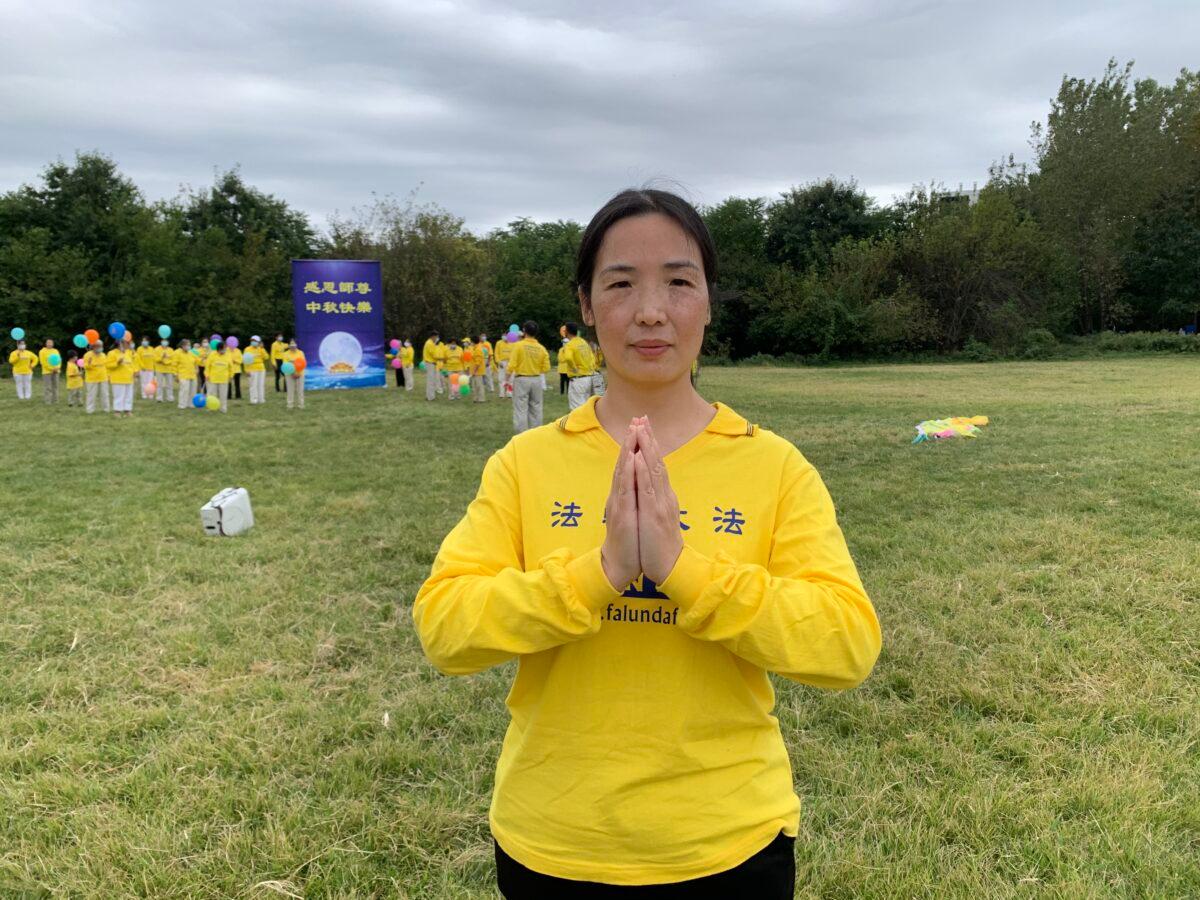NEW YORK—The day marked the Mid-Autumn Festival, the second-most important Chinese celebration of the year, when families gather to share mooncakes and marvel at the harvest moon at its fullest. But Xiao Ping wasn’t in the mood for festivities.
In front of a small booth furnished with banners, flyers, and booklets in Flushing, New York, she showed up as usual, smiling to passersby with a flyer in hand. Sometimes mainland Chinese hurled insults or called her a traitor.
On top of her little booth, the characters read “Falun Dafa Is Good” and “Truth Compassion Forbearance.”
It was Xiao’s second Mid-Autumn Festival in New York. An adherent of the spiritual discipline, the 47-year-old from China’s southeastern Nanchang city left the country in August 2019 with her teenage son to escape the incessant persecution targeting their spiritual belief.
Her voice quivered as she spoke of loved ones she left behind—her husband, her sister, her mother (who’s in her 80s), and friends who have also been persecuted because of their faith.
“You made the right choice to go to America, but we can’t bear to part with you,” Xiao’s sister once told her on a phone call.

Arrests
Rooted in ancient Chinese traditions, Falun Dafa, also known as Falun Gong, consists of moral teachings and a set of gentle exercises. It surged in popularity in China in the 1990s—until the Chinese Communist Party (CCP) launched an expansive campaign in 1999 to eradicate the practice.An estimated 70 million to 100 million Chinese who took up the practice have since become targets for torture, imprisonment, forced labor, and live organ harvesting. Meanwhile, the regime has deployed widespread propaganda designed to stigmatize adherents and incite hatred against the group.
Between 1999 and 2001, Xiao was detained three times at the same local detention center, on each occasion in wintertime when the temperature had dropped below freezing. She remembered the acrylic towels that would harden into an icy block and the meager amount of boiled greens they ate every day, with maggots floating at the top and a layer of sand at the bottom.
“There’s sand in every bite,” she said. “It’s impossible to eat the meal if you want to spit out the sand.”
Inside the tiny prison cell, she had to sleep squeezed in with as many as a dozen detainees on a hard wooden plank meant to hold half that number. The plank was inclined, forcing everyone to sleep head-to-head with no space to move or change position.
“When it became tiring, we all ... turned our body the other way in sync,” Xiao said. During the day, they would sit on a concrete bench next to the bed.
Because of the lack of nutrition, the prisoners suffered from constipation lasting for weeks, which often ended with days of diarrhea after their monthly treat of pork—from pigs raised by the prison.
Taking showers was a luxury and an ordeal due to the scarce water supply, which was cold and would usually cut off before they could finish. To avoid directly touching the cold water, she sometimes used a wet towel to clean herself. “The dirt would rain down after you rubbed your skin,” she said.
In 2001, she was transferred from the detention center to a labor camp. She spent five months there making dog sweaters that she suspected were for export. When not working, the detained practitioners were made to sit on low stools to watch propaganda videos that vilified Falun Gong. The guards would not allow their relatives to visit them unless they shouted insults about the practice, Xiao said.
In 2015, Xiao and dozens of other local practitioners filed lawsuits against Jiang Zemin, the former Chinese leader who unleashed the persecution campaign, drawing retaliation from authorities.
“Everyone says you guys are good people, but so what? You aren’t allowed to practice,” the man told her shortly before she was fired. “If you practice Falun Gong, you are the enemy, enemy, enemy,” he said, pointing a finger at her nose.
Healing
The traumatic years have left a mark on her son. When their New York landlord came to help them set up the internet not long after they settled down, his first reaction was to hide their Falun Gong books into a drawer so the landlord wouldn’t see them.That small act gave “a sting in my heart,” she said. She explained to her son that they’re “now in America” and no longer need to hide the books.
Like many new immigrants, Xiao juggles odd jobs; she also needs to take care of her son, and she finds time to meditate and spread awareness about the ongoing persecution, now in its 21st year. The daily toil is nothing compared to the “extremes” she’s seen in China, she said.
A practitioner from Xiao’s home city who is the same age as her was recently handed another 9 1/2-year jail sentence after having previously spent nine years in prison. “How many ‘nine years’ are there in one’s life?” Xiao said.

Ahead of the Mid-Autumn Festival, Xiao joined hundreds of Falun Gong practitioners in New York to send holiday greetings to the founder of Falun Gong, Mr. Li Hongzhi.
The change of environment has made Xiao feel lighter, and “even breathing feels easier,” she said. She recalled an event at Times Square in September 2019, when about 100 practitioners joined for a session of sitting meditation.
It was the first time in years she was able to fully relax and completely forget where she was, she said.
“Do you know how loud the surrounding area was?” Xiao said, noting the “banging” sound of loudspeakers as people sang and danced about. But after 30 minutes, all she heard was the serene meditation music, as if she had been transported to a different world.





